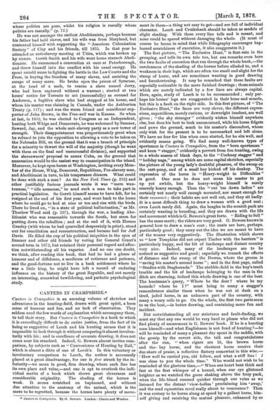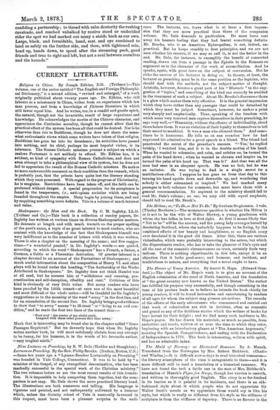CANTERS IN CRAMPSHIRE.*
Canters in Crampshire is an amusing volume of sketches and adventures in the hunting-field, drawn with great spirit, a keen sense of humour and fun, and no lack of observation. They seldom need the few words of explanation which accompany them, to tell their story. But Canters in Crampshire is a book to which it is exceedingly difficult to do entire justice, from the fact of its being so suggestive of Leech and his hunting scenes that it is impossible to look through it without comparingit almost involun- tarily with his ; and in excellence of accurate drawing, it does not come near his standard. Indeed, G. Bowers almost invites com- parison, by subjects such as " Convenience of Hunting by Rail," which is almost a ditto of one of Leech's. In this voluntary or involuntary comparison to Leech, the author is necessarily placed at a great disadvantage, for one is first struck by the in- feriority—we mean in good, firm drawing, where each line has its own place and value,—and one is apt to overlook the indi- tvidual merits of a book which shows great cleverness and 'considerable originality. The shading of the horses is weak. It seems scratched on haphazard, and without due attention to the anatomy of the animal, which is the more to be regretted, because the horses have plenty of move- 4 Canters in Crampshire. By 0. Bowers. London: Chatto and Windus.
ment in them—a thing not easy to get—and are full of individual character. Leech and Crnikshank should be taken as models of slight shading. With them every line tells and is meant, and none could be spared without damaging the whole. (It must of course be borne in mind that while lithography encourages hap- hazard scratchiness of execution, it also exaggerates it.) The first picture, "The Exclusive Hunt," is first-rate in the grouping, and tells its own tale too, but one remarks even here the two faults of execution that run through the whole book,—the carelessness of the shading of the horses before alluded to, and a weakness in their legs, which are often too small and slight for the stamp of horse, and are sometimes wanting in good drawing and foreshortening. It may be remarked that these faults are especially noticeable in the more finished drawings ; those animals which are merely indicated by a few lines are always capital.
Here, again, study of Leech is to be recommended ; only per- haps his horses' legs are exaggerated in their bone and muscle, but this is a fault on the right side. In this first picture, of " The Exclusive Hunt," the faces are very clever, the different expres- sions, supercilious, merely curious, or downright insolent, are well given ; " the shy stranger " evidently wishes himself anywhere else, but does his best to look unconcerned, while his horse fidgets and paws the ground, much to his master's discomfort, whose only wish for the present is to be unremarked and left alone.
We have no fear for him when once started, for he sits well, and
evidently means going. We find many well-known types of sportsmen in Canters in Crampshire, from the " born sportsman"
and keen " stagger," evidently a pervert from fox-hunting, owing
to a whole season of blank days, to the "Cockney stagger" and " holiday nags," among which are some capital sketches, especially the picture of the young lady's doubtful pleasure, of the sweep on
the cart-pony, and of a small boy kicked off his donkey. The expression of the horse in " Heavy-weight in Difficulties " is good. One sees he does not mean his master to get up yet awhile, but the heavy-weight himself is surely scarcely heavy enough. Then the " cut 'em down ladies " are certainly not nearly well enough mounted, nor smart enough for
their renommee ; their habits are not well cut, and they sit badly.
It is a most difficult thing to draw a woman with a good seat ; even Leech rarely did. Again, the beagles in the scratch pack are certainly wanting in breeding, and they are drawn with the life
and movement which is G. Bowers's great forte. " Riding to Sell " has the same merit ; the riders are very good. G. Bowers knows in general how to draw a man's coat ; the coats are here, perhaps, particularly good ; they carry out the idea we are meant to have
of the wearer very suggestively. The illustration which shows us " how Tompkins did not expect Timber with the harriers" is particularly happy, and the bit of landscape and distant country very nice. Indeed, many of the landscapes are to be noticed as suggestive and good ; especially we remark the effects of distance and the sweep of the Downs, where the groom is "saving his master's second horse " ; and in the first page, called " Studies with Staghounds." The stubble-field in the boy's tenth tumble and the bit of landscape belonging to the man in the ditch are charming, indeed this whole drawing is one of the best.
The huntsman's query, " Where be the deer ? where be my hounds? where be I ?" must bring to many a stagger's remembrance similar times when he was out at dusk on a tired, jaded horse, in an unknown part of the country, with many a weary mile to go. On the whole, the first two parts seem to us the best,—in better drawing, and containing more fun and incident.
But notwithstanding all our strictures and fault-finding, we must say that any one would be very hard to please who did not find plenty of amusement in G. Bowers' book. If he is a hunting man himself—and what Englishman is not fond of hunting?—he will be reminded of many a pleasant day spent in the saddle, with the gossip by the covert side, the talk and congratulations after the run, " when cigars are lit, the brown horse and the• bay horse, and the chestnut horse receive their due share of praise, a reflective flattery somewhat in this wise,-
' How well he carried you, old fellow, and what a stiff line ! 1 was close to you the whole time." Who would not wish to be reminded of the glorious time,—" When our heart beat thick and fast at the first whimper of a hound, when our eye glistened brighter as we watched the gorse shaking above the busy pack, when the life-blood coursed quicker through our veins as we listened for the distant ' view-holloa ' proclaiming him 'away,' and the mad equestrian revel really about to commence? Then it was ecstasy to be borne along at speed by a gallant horse, him- self giving and receiving the mutual pleasure, enhanced by so
confiding a partnership ; to thread with calm dexterity the rushing cavalcade, and reached nnbalked by restive steed or undecided rider the spot we had marked out many a stride back as our own. Large, black, and formidable, hand, seat, and eye combined to land us safely on the further side, and then, with tightened rein, head up, hands down, to speed after the streaming pack, good friends and true to right and left, but not a soul between ourselves and the hounds."



































 Previous page
Previous page